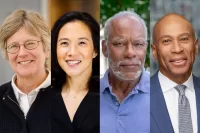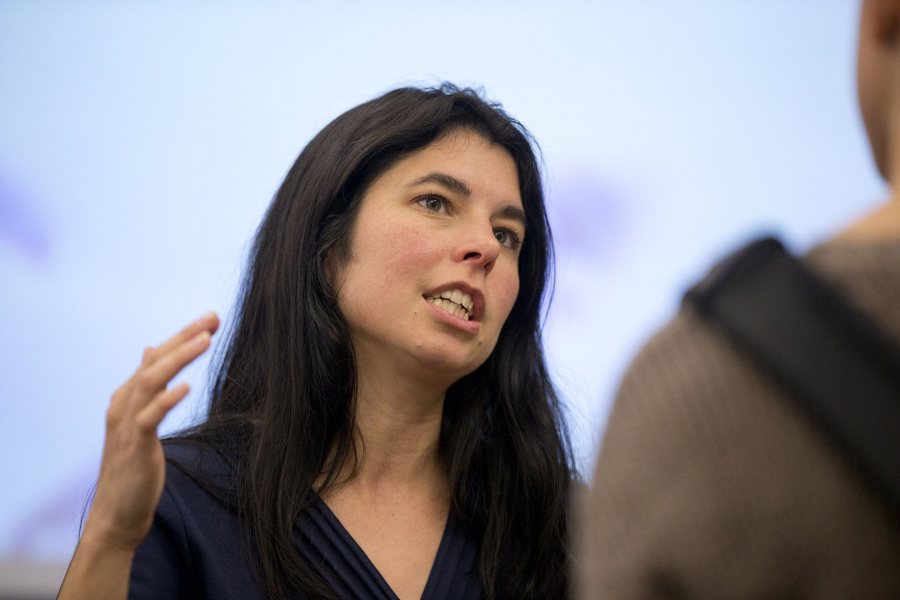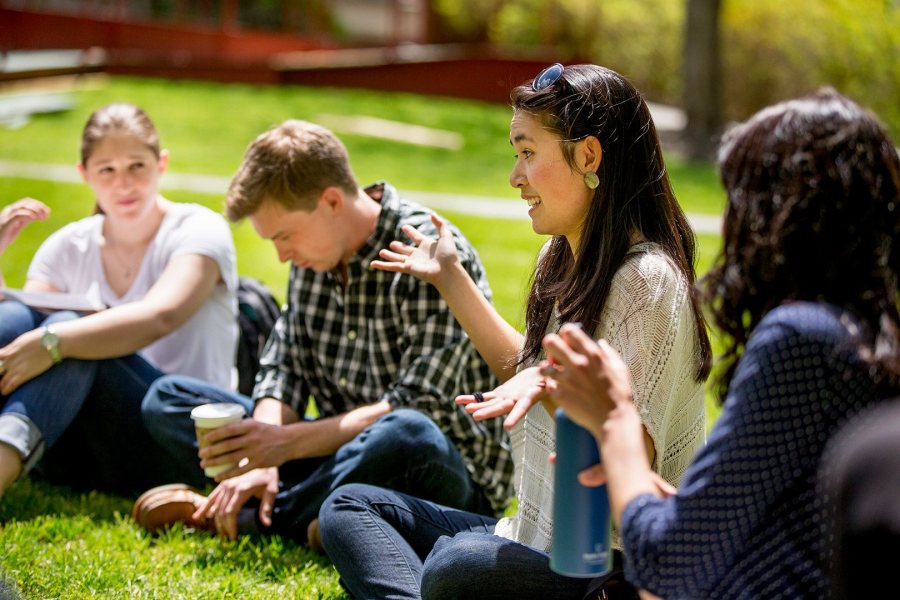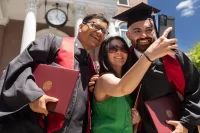
Q&A: Bates psychologist Rebecca Fraser-Thill on drawing a blueprint for your future

Building your life is more than jobs, budgets, and taxes, says Lecturer in Psychology Rebecca Fraser-Thill. “There has to be some deeper thread running underneath so you know why you’re doing all those things.” (Phyllis Graber Jensen/Bates College)
It may sound macabre, especially on the eve of a weekend when the gates to the future will open wide for the Bates Class of 2016. But if you want students to think intentionally about the adult lives they’ll lead, you can ask them to envision the future “retrospectively” — by writing their own obituaries.
The idea is that formally summarizing your life, even if that summary is speculative, can cause you to consider what you really want your story to be.
It’s an assignment that Rebecca Fraser-Thill gave in a course she introduced for Short Term this year. “Life Architecture: Designing Your Future” gives students know-how, habits, and — crucially — self-knowledge that will help them make the best marriage of profession and personal fulfillment.
If that sounds like an objective of the college’s ambitious Purposeful Work initiative that President Clayton Spencer instituted at Bates in 2013, it’s no coincidence. Fraser-Thill, a lecturer in psychology, also directs program design for Purposeful Work.
And the course, one of several offerings under the aegis of Purposeful Work during Short Term 2016, may be the purest distillation of that initiative to date. Where Purposeful Work is a college-wide emphasis on preparing students for lives of meaningful work, “Life Architecture” takes very specific aim at that goal.
On the one hand, Fraser-Thill has used philosophy and psychology to teach students to harmonize their interests, abilities, and values as they consider career choices now and in the future. On the other, the course has been a cornucopia of practical guidance, much of it from visiting alumni, guests, and Bates Career Development Center staff, for life in the real world.
And the students’ final project is a so-called Purposeful Work Blueprint that includes the obituary.
We talked with Fraser-Thill about the course on May 4.
This course merges approaches to reflection and self-awareness with practical instruction. How does that play out?
We’ve been toggling between the two, and it’s a challenge. For instance, we spent part of one day on networking, and then looked at apartment searches and leases, and taxes — so it was just about as pragmatic as you can get.
Then we spent most of the following day looking at personality in relation to the Myers-Briggs Type Indicator and discussing the book Man’s Search for Meaning by Viktor Frankl, so that’s just about as philosophical as you can get.
Building a life is about so much more than being able to pay your taxes and to budget properly, and to find a place to live. There has to be some deeper thread running underneath so you know why you’re doing all those things.
This course and the Purposeful Work initiative encourage students to engage with the question of infusing meaning into one’s work. Not everyone in the workforce has, or feels they have, any opportunity for that.
Questions of privilege arise. So Viktor Frankl’s Man’s Search for Meaning [published in 1946] was our biggest foray into that. Here’s a person who was in the Holocaust, in a concentration camp, who basically had every choice taken from him and was in the least privileged circumstance you could imagine.
Yet he makes the case that all of human endeavor is really about finding meaning, and that you can make the choice to create meaning, whatever your circumstance. So even in the concentration camp, he was actively creating meaning for himself, which is incredible. Frankl makes the point that individuals who gave up their sense of meaning in the concentration camp were more likely to die than those who had something to live for.
Podcaster Megan Tan is getting great reviews for Millennial, her series about negotiating one’s 20s. You invited her to a class and she’s had a presence in your curriculum.
Yes, we’ve talked about her in a number of contexts. For instance, Tan talks about this concept of “the line,” a composite of your hopes and dreams and goals, as well as your sense of right and wrong, all leading in some direction. Do you have a different line for your personal and your professional? In what ways does the world around you define your line? How do you define it for yourself? What if they’re in conflict with each other?

Megan Tan, whose podcast “Millennial” is increasingly well-known, speaks to students in the course “Life Architecture.” (Phyllis Graber Jensen/Bates College)
The brain isn’t fully developed until age 25 or so, broadly speaking. In terms of brain development, are your students ready to be grappling with the “Life Architecture” subject matter?
I think they need to be. When you look at identity development in particular, we know that people go through a variety of stages. Here we’re focusing on occupations, and early in life you don’t even think about it, right? Maybe you have a notion, like, “Oh, I’ll be a vet,” but it’s not considered at all.
Then you go through a stage of taking on what other people think is good for you, and what you see modeled by your parents or other relatives. And then you go through a place of crisis, an identity moratorium, where you’re questioning actively, trying different things out.
Developmentally, the early 20s is an ideal time for that questioning period.
And then you move into really knowing what you want to do. So, developmentally, the early 20s is an ideal time for that questioning period, where you are actively trying out different possibilities, considering pros and cons, thinking through how they mesh with your values, interests, personality, skills. And you’re really making some intentional decisions about what you want to try next.
The research is pretty clear that if you don’t complete that problem of searching by your late 20s, there can be a real fall-off in your life satisfaction. So there is a window for doing that searching and doing it well.
You just mentioned the importance of job satisfaction to life satisfaction.
Yes, it’s extremely important. We know from the literature that life satisfaction derives from doing what you like every day and using your strengths every day. And that a sense of career well-being then predicts all other types of well-being — including our physical well-being, financial well-being, social well-being, and community well-being. All of those are predicted by how we feel about our careers.
That is huge.
Isn’t it? So, at the right juncture in your development, if you don’t step back and do this philosophical examination, all of these facets of your life are less likely to function well, which is fascinating.
Now, do I feel some students pushing back and being like, “I don’t really want to go there?” Yes, to an extent. And to get those students from not deeply questioning to a place of examining and even finding answers, five weeks is a pretty quick time.
So it would seem that a big part of your job is to get them into the habit of thinking intentionally about these things.
That’s what I’m trying to do, exactly. Planting seeds and showing them some habits they could use, like journaling. This is a great way to gain insight into what you’re thinking about, see patterns of thought, and reflect on experiences so you can make meaning of them.
And we’ve talked a lot about networking and informational interviewing, and those are great ways of gaining information about the world. So we’re trying to give them tools — talk to other people, journal, reflect, and start to put all this all together.
A key outcome of the course is for students to develop a blueprint for their working lives.
The major idea is for them to reflect on their journals to see what kind of themes are coming out of them, to create some coherence about the self-assessments they’ve done — values, personality, skills, and interests — and to consider the impact they’d like to have on the world around them.
Then, based on all of this, they can think about immediate next steps, and hopefully have this document to look back on as they make decisions, even years after graduating.




